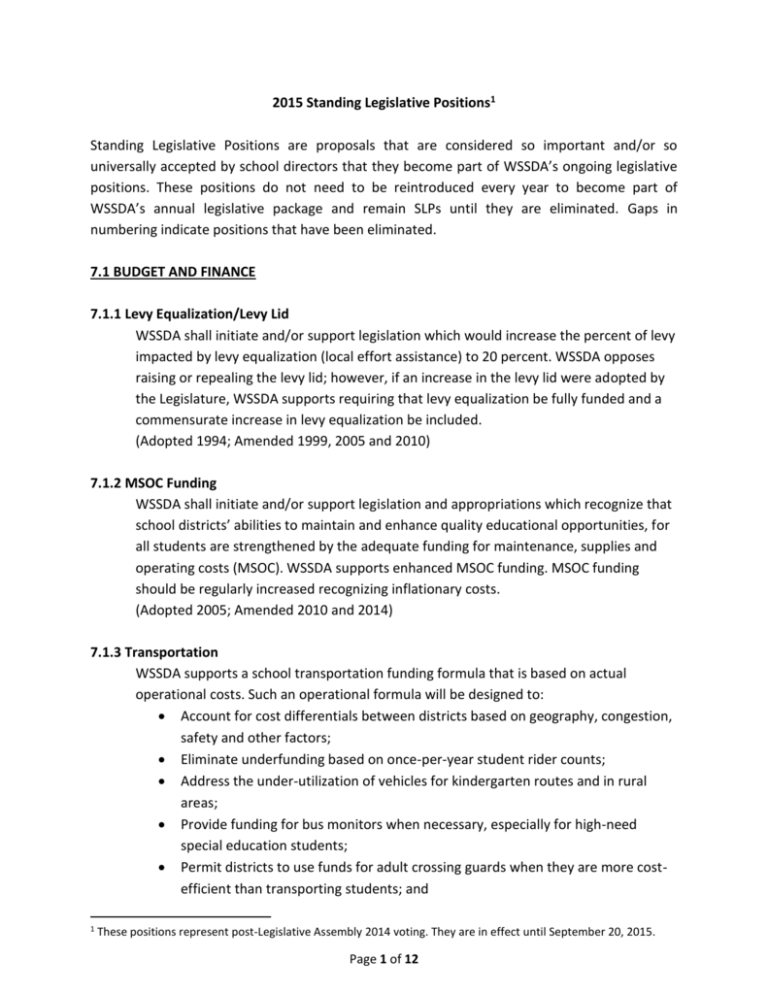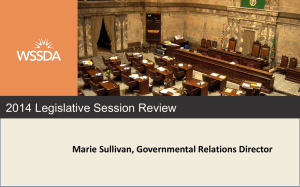Standing Legislative Positions - Washington State School Directors
advertisement

2015 Standing Legislative Positions1 Standing Legislative Positions are proposals that are considered so important and/or so universally accepted by school directors that they become part of WSSDA’s ongoing legislative positions. These positions do not need to be reintroduced every year to become part of WSSDA’s annual legislative package and remain SLPs until they are eliminated. Gaps in numbering indicate positions that have been eliminated. 7.1 BUDGET AND FINANCE 7.1.1 Levy Equalization/Levy Lid WSSDA shall initiate and/or support legislation which would increase the percent of levy impacted by levy equalization (local effort assistance) to 20 percent. WSSDA opposes raising or repealing the levy lid; however, if an increase in the levy lid were adopted by the Legislature, WSSDA supports requiring that levy equalization be fully funded and a commensurate increase in levy equalization be included. (Adopted 1994; Amended 1999, 2005 and 2010) 7.1.2 MSOC Funding WSSDA shall initiate and/or support legislation and appropriations which recognize that school districts’ abilities to maintain and enhance quality educational opportunities, for all students are strengthened by the adequate funding for maintenance, supplies and operating costs (MSOC). WSSDA supports enhanced MSOC funding. MSOC funding should be regularly increased recognizing inflationary costs. (Adopted 2005; Amended 2010 and 2014) 7.1.3 Transportation WSSDA supports a school transportation funding formula that is based on actual operational costs. Such an operational formula will be designed to: Account for cost differentials between districts based on geography, congestion, safety and other factors; Eliminate underfunding based on once-per-year student rider counts; Address the under-utilization of vehicles for kindergarten routes and in rural areas; Provide funding for bus monitors when necessary, especially for high-need special education students; Permit districts to use funds for adult crossing guards when they are more costefficient than transporting students; and 1 These positions represent post-Legislative Assembly 2014 voting. They are in effect until September 20, 2015. Page 1 of 12 Allow districts to use bonds or multi-year levies to purchase student transportation equipment. (Adopted 2001) 7.1.4 Special-Needs and At-Risk Students WSSDA shall initiate and/or support legislation that will provide enhanced funding for programs for special-needs and at-risk students and for those districts with proportionately higher numbers or higher costs of such students. (Adopted 1990; Amended 2011) 7.1.5 Increased Funding for High-Poverty Schools WSSDA shall initiate and/or support state and federal legislation that would provide sufficient additional direct funding for each student that qualifies for Free and Reduced Price meals to significantly close the achievement – opportunity gap. An even higher level of funding should be provided to schools with high concentrations of students that qualify for Free and Reduced Price meals. (Adopted 1991; Amended 2012) 7.1.6 Special Education Funding WSSDA shall initiate and/or support legislation which requires full funding for mandated Special Education programs and services; such programs and services should maximize assistance to children rather than to their various categorizations and assessments. Any state funding formula shall: recognize that costs will vary according to the needs of every child and, therefore, for every district, based upon the I.E.P. of each student; provide adequate funding for all of the required services for eligible special education students without imposing an artificial cap; exclude from any special education program enrollment funding caps students for whom districts do not receive an annual basic education allocation; and recognize that any funding formula based upon the assumption that every district has the same budget percentage costs for special education is inherently flawed and will not work. (Adopted 1988; Amended 1990, 1996, 2005 and 2014) 7.1.7 Education for Gifted WSSDA shall initiate and/or support legislation which would assure funding for the education of gifted students at a level of 10 percent of the student population, place that funding within the basic education allocation system and set a minimum number of students to be funded in small school districts. (Adopted 1987; Amended 2005) Page 2 of 12 7.1.8 All-Day Kindergarten WSSDA shall initiate and/or support legislation for the funding of kindergarten for all districts that chose to offer full-day kindergarten at 1.0 FTE. Legislation will include provisions to change the space allocation formula for un-housed students to reflect fulltime kindergarten. (Adopted 1990; Amended 2004 and 2006) 7.1.9 Full-Time-Equivalent Computation WSSDA shall initiate and/or support legislation which would modify the method of computing a full-time-equivalent secondary student for the purpose of state apportionment for those students who are enrolled in more than twenty-five hours of instruction per week. (Adopted 1987) 7.1.10 Technology Funding WSSDA shall initiate and/or support legislation which would fully fund the provision and maintenance of technology in school districts, as a part of basic education, to a statewide standard established by OSPI, in consultation with its K-12 technology advisory committee. (Adopted 2010) 7.1.11 Remote and Necessary Schools WSSDA shall initiate and/or support legislation which continues to recognize the highcost nature of providing educational programs and services to school plants designated as being remote and necessary. WSSDA supports the current concept of additional funding for these school plants until full funding of the requirements of ESHB 2261 is implemented. (Adopted 1991; Amended 2012) 7.1.12 Full Funding of Basic Education WSSDA shall initiate and/or support legislation that fully funds and implements all aspects of Washington’s redefined program of Basic Education as outlined in ESHB 2261 (Chapter 548, Laws of 2009). (Adopted 2012) 7.1.13 Pension Funding WSSDA shall initiate and/or support legislation or budget provisions requiring the state to adequately fund pension programs. (Adopted 2012) Page 3 of 12 7.1.14 Enrollment Decline WSSDA shall initiate and/or support legislation that would lessen the negative fiscal impact when districts are adversely impacted by a dramatic decline in student enrollment. (Adopted 2010) 7.1.15 Career and Technical Education Funding WSSDA shall initiate and/or support legislative action that will amply fund career and technical education for seventh through twelfth grade, including appropriate staff, equipment and minor facility remodeling. (Adopted 2011) 7.1.16 School Construction WSSDA supports “ample provision” for school construction through state policies that: Fund school construction needs when districts are determined eligible; Maintain a reliable system of funding that supports adequate planning at the local level; Provide specific sources of revenue to support and enhance state trust revenue; Give highest priority to projects that address un-housed student needs, either through new construction or remodeling Allocate square footage to meet current and future program needs; Recognize realistic construction costs including mandated green building costs; and Equalize funding for modernization of existing school facilities in lieu of abandonment and new construction. (Adopted 2001; Amended 2008) 7.1.17 School Construction Funding WSSDA shall support an increase to the state’s funding formulas for school construction so that the allocation of square feet per student at least meets the national average is adjusted to address the changes in class size and changing graduation requirements, and the actual costs of construction for the implementation of legislation. (Adopted 2005; Amended 2008 and 2014) 7.1.18 Passage of School Finance Issues WSSDA believes that passage of all school finance issues should be by a simple majority of the ballots cast on those issues. (Adopted 1977; Amended 2000 and 2001) Page 4 of 12 7.1.19 Fiscal Note WSSDA supports requiring identification of the local cost of compliance (fiscal notes) for any proposed state laws or administrative rules which would affect educational programs or services, as a means of avoiding unfunded mandates. (Adopted 1978; Amended 2002) 7.1.20 Forest Revenue Apportionment Withholding WSSDA shall initiate and/or support legislation preventing the State from withholding moneys from the State’s monthly apportionment in the amount equal to state forest revenue or to the federal forest fees received by school districts from the federal government. (Adopted 2013) 7.1.21 Baseline MSOC Funding WSSDA shall initiate and/or support legislation that creates a system to allocate adequate revenue to School Districts for relief of the burden of Materials, Supplies, and Operating Costs (MSOCs) with a required review by OSPI every four years of actual costs as submitted by schools districts. (Adopted 2014) 7.1.22 Exempting Fund Balance WSSDA shall initiate and/or support legislation that exempts district fund balances from supplanting shortfalls in state funding. (Adopted 2014) 7.1.23 Grandfathered Inequities WSSDA shall initiate and/or support legislation that removes grandfathered inequities in K-12 education levy lids. (Adopted 2014) 7.1.24 Impacts to Common School Funding Revenues WSSDA shall oppose legislation that negatively impacts funding revenues that are traditionally used to support common schools, such as impact fees, collection timing, and property tax capacity. (Adopted 2014) 7.1.25 Sustainable Revenue for Education Funding WSSDA shall initiate and/or support legislation to implement a comprehensive, attainable, stable and sustainable funding plan for education in Washington State. (Adopted 2014) Page 5 of 12 7.2 UNFUNDED MANDATES 7.2.1 Unfunded Mandates WSSDA shall initiate and/or support a requirement that all legislation mandating K-12 programs or services provide full funding for all costs, including incidental, administrative and non-employee and other related costs of the programs or services. Additionally, if adequate funding is not provided to school districts to comply with currently mandated programs or services, those mandates should be eliminated. (Adopted 2005; Amended 2009) 7.2.2 Truancy Becca Funding WSSDA shall initiate and/or support legislation that: (1) provides adequate state compensation to school districts for additional secretarial and administrative time to monitor truancies, send letters, prepare court documents and truancy petitions, attend court hearings and provide follow-up supervision for Becca compliance; or (2) eliminate the Becca law if the funding is not continually forthcoming. (Adopted 2010) 7.3 SCHOOL OPERATIONS 7.3.1 Open Public Meetings Act WSSDA shall initiate and/or support legislation that maintains the current provisions of the Open Public Meetings Act, including without limitations those that allow for confidential executive sessions of the governing board for specified purposes, that allow for the presence of necessary individuals other than board members, and that do not require minutes, taping or any other record of the discussions that transpire in sessions. (Adopted 2011) 7.3.2 School Year WSSDA shall initiate and/or support legislation which provides state-funded training and planning time for staff and more academic time for students, in the following manner: Provide for summer school programs; Substantially increase the length of the students’ school year; Assure that staff has planning and in-service time in excess of the students’ calendar year; and Provide financial flexibility and incentives for local districts to operate yearround instruction in any or all of their school buildings. (Adopted 1988; Amended 1990, 1992 and 2005) Page 6 of 12 7.3.3 Exclude School Calendar from Mandatory Negotiations WSSDA believes that the school calendar is a matter of public concern and should not be a mandatory subject of collective bargaining. (Adopted 1979; Amended 2001) 7.3.4 Community Schools WSSDA shall initiate and/or support legislation to encourage and incentivize cooperative partnerships and/or joint use of facilities with the local community, such as early learning providers, social service providers, community and technical colleges, and public baccalaureate institutions. The legislation should include revisions in the current calculation of “instructional space” so school districts are not penalized by the loss of any state construction funding due to the facilities partnership. (Adopted 2011) 7.3.5 Building Improvements WSSDA shall initiate and/or support legislation to permit school districts in the state of Washington to make limited improvements of not more than 10 percent of the current value of the facility, such as energy retrofits, in existing facilities without requiring a review and/or upgrading of the entire building to meet current codes in other areas. (Adopted 1992) 7.3.6 Public Records Act WSSDA shall initiate and/or support legislation clarifying that any notes taken or electronic recordings made during an executive session are exempt from disclosure under the Public Records Act. (Adopted 2012) 7.3.7 Student Contact Time WSSDA shall initiate and/or support legislation that allows school districts to meet the requirements of state law for funding purposes through the use of student contact time rather than student contact days without having to seek waivers from either SBE or OSPI. (Adopted 2012) 7.3.8 Students in Residential Placement WSSDA shall initiate and/or support legislation mandating collaboration and coordination between school districts, OSPI, and those state agencies responsible for placing challenging students in residential placements to develop: An agreement by all key agencies on how such students are placed in communities across the state; Page 7 of 12 Policy and procedures that mandate timely, collaborative district-agency planning before challenging students are actually moved into school districts; and Mechanisms whereby fiscal resources are shared by agencies with those school districts charged with educating these students. (Adopted 2013) 7.3.9 Mandatory School Age WSSDA shall initiate and/or support legislation lowering the age for mandatory school attendance from eight to six. (Adopted 2013) 7.3.10 Legal Notices Website WSSDA shall initiate and/or support legislation allowing the use of a state or district website for legal notices currently required by law to be published in a newspaper. (Adopted 2013) 7.3.11 Attorney/Client Privileges WSSDA shall oppose legislation that would erode the attorney/client privilege and current law related to the non-disclosure of attorney work product materials and other communication between a school district and its legal counsel. (Adopted 2014) 7.3.12 Average Daily Attendance (Unexcused Absence) WSSDA opposes any legislation that requires district to use average daily attendance for student FTE funding. (Adopted 2014) 7.3.13 Immigration Status WSSDA opposes any legislation that would require school districts to inquire into the immigration status of a student or his/her family, or exclude students based on their actual or perceived immigration or citizenship status. (Adopted 2014) 7.4 GOVERNANCE 7.4.1 Consolidation/Erosion of School Districts WSSDA believes that consolidation of local school districts should occur only through a process of voting by the affected citizens and not by legislative mandate. (Adopted 1982; Amended 1986 and 1994) Page 8 of 12 7.4.2 State Board of Education Membership WSSDA shall initiate and/or support legislation to change the composition of the State Board of Education so that the majority is elected by school board directors. (Adopted 2013) 7.4.3 Federal DREAM Act WSSDA shall initiate and/or support the enactment of a process allowing immigrant students a path toward becoming lawful U.S. residents. (Adopted 2014) 7.4.4 WSSDA Universal Membership and Dues WSSDA shall initiate and/or support legislation that maintains the current dues structure in statute and the association’s state agency status. (Adopted 2014) 7.5 EARLY LEARNING AND HIGHER EDUCATION 7.5.1 Early Childhood Education WSSDA shall initiate and/or support legislation which would provide funding for public early childhood education and assistance programs. (Adopted 1991; Amended 2011) 7.5.2 Conditional Scholarships WSSDA shall initiate and/or support legislation that provides policy change to link state conditional college scholarships and loan repayment with federal conditional scholarship and loan repayment programs. Both programs provide scholarship and loan repayment in exchange of teaching service in Washington state’s public K-12 schools in high-need areas — including high-need areas of teaching, such as special education, math, science and teachers with bilingual abilities and high-need districts of the state. These two programs should be linked to maximize the benefit of state dollars. (Adopted 2011) 7.6 PERSONNEL AND CONTRACTS 7.6.1 School Employee Salaries WSSDA shall initiate and/or support legislation which would require parity for all educational employee groups whenever state salary increases are provided and which would assure the state of Washington of having salaries for education personnel that would allow them to remain competitive with other states and commensurate with comparable professions. (Adopted 1988; Amended 1990) Page 9 of 12 7.6.2 Salaries — Experience Recognition WSSDA shall initiate and/or support legislation that would recognize employment experience as a registered nurse, occupational therapist, physical therapist, communication disorders specialist/speech pathologist, audiologist, psychologist, social worker, counselor or career/technical education professional in a position which requires Washington state licensing, certification or a degree that is comparable to that required for Washington state teacher certification. (Adopted 2010, Amended 2013) 7.6.3 Administrators for Small Schools WSSDA shall initiate and/or support legislation that would assure stable financial support for the proper and adequate administrative staffing in small schools and small school districts; preferably at least one administrator per district. (Adopted 1990) 7.6.5 Health Care Bargaining WSSDA shall initiate and/or support legislation which would exclude funding of health benefits from being negotiated in school district’s collective bargaining agreements. (Adopted 2010) 7.6.6 Strikes and Labor Disputes WSSDA is opposed to strikes as a means of settling disputes in public education as referenced in RCW 41.56.120. WSSDA strongly supports decisions by Washington courts that strikes by public employees are illegal. Participants in strikes should suffer economic losses or professional sanctions. WSSDA supports legislation that would: 1. Remove mandatory binding arbitration as the means of resolving impasses in negotiations. It is against the public interest to give final authority over the schools’ operations to an arbitrator, who has no continuing responsibility for implementing an arbitration award. 2. Impose penalties upon either party who fails to participate in impasse processes and other required procedures designed to promote agreement before the beginning of school. When a local school district is faced with a strike, WSSDA recommends that the school board take the action, including injunctive relief, it deems necessary to fulfill its obligation to students and patrons. During a strike, WSSDA will provide services or assistance requested by the local school board. (Adopted 2001, Amended 2013) Page 10 of 12 7.6.8 Fiscal Nonrenewal Date WSSDA shall initiate and/or support legislation to change the staff non-renewal notification deadline to May 15 or 30 days after the budget becomes law, whichever occurs last. (Adopted 1993, Amended 2013) 7.6.10 Diversity Training WSSDA shall initiate and/or support legislation and/or regulations that include an academic experience of diversity requirements of certification for all new teachers, administrators and educational staff associate preparation programs. Additionally, continuing education programs will offer diversity training classes. (Adopted 1995; Amended 2003) 7.6.11 Alternative Routes to Teacher Certification WSSDA shall initiate and/or support legislation that maintains or increases funding for alternative routes to teacher certification in state-identified shortage areas, particularly for those routes that allow Para- Educators and other classified instructional employees to attain a teaching certificate. (Adopted 2012) 7.6.12 Retirement Incentives WSSDA shall initiate and/or support legislation that would allow the state to offer early retirement incentives for teachers statewide, provided that participation in the program is voluntary and that teachers are legally protected from pressure to participate. (Adopted 2013) 7.6.13 Alternative Routes to Principal Certification WSSDA shall initiate and/or support legislation that allows school districts the option of hiring school principals who have not worked in a classroom, provided the person is enrolled in an alternative route towards principal certification and meets experiences and leadership requirements specified by the district. (Adopted 2014) 7.6.14 OSPI Investigations WSSDA shall initiate and/or support legislation that requires OSPI to complete all district personnel investigations within six months of the date they are filed. (Adopted 2014) Page 11 of 12 7.6.15 Retroactive Cuts and Reductions in Force WSSDA shall initiate and/or support legislation and policy to ensure that in the event the Washington State Legislature again chooses to make funding reductions to school districts during the academic year in which those committed funds were intended to be spent, then the Legislature must also via specific legislative action change the provisions of RCW 28A.405 to create a clear, efficient and effective mechanism enabling school districts to terminate certificated contracts mid-year when state funding is reduced during that year. Any such employee reduction must not require bargaining action by the district and shall in no case exceed the total amount of funding allocation reductions from the Legislature for that school district. (Adopted 2014) 7.6.16 Teacher Seniority and Reductions in Force WSSDA shall initiate and/or support legislation that would support district consideration of variables, in addition to teacher seniority, when faced with a reduction in force due to declining enrollment or reduced state funding. (Adopted 2014) 7.7 STATE GOVERNMENT AND TAX POLICY 7.7.1 Tax Reform WSSDA shall initiate and/or support legislation to restructure the Washington State tax system to establish a stable, broad-based, flexible source of revenue for the State of Washington which is equitable and adequate, in order to ensure better educational funding as well as to provide other essential state services. (Adopted 1989, Amended 2013) 7.8 STUDENT ACHIEVEMENT 7.8.1 Career and College Ready Diploma WSSDA shall initiate and/or support legislation that makes school district implementation of the Career and College Ready Diploma (24 credits) voluntary until full funding of district costs for new credit requirements is provided. (Adopted 2014) 7.8.2 Delinking Assessments from Graduation Requirements WSSDA shall initiate and/or support that removes state-mandated assessments as a graduation requirement. (Adopted 2014) Page 12 of 12








